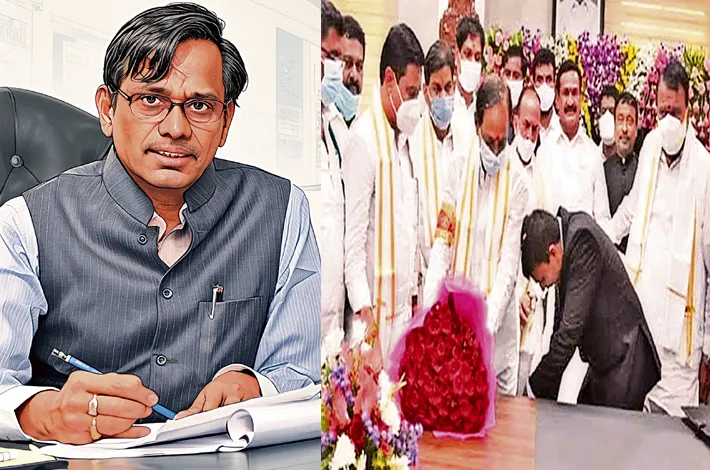IAS Officers Beware: Navigating the Fine Line Between Duty and Legal Accountability
23-05-2025 12:00:00 AM

In India’s parliamentary democracy, the All India Services (AIS), particularly the Indian Administrative Service (IAS), are often described as the "Steel Frame" of governance. Tasked with implementing policies and ensuring effective administration, IAS officers wield significant influence.
However, recent high-profile cases, such as the arrest of K Dhanunjaya Reddy in Andhra Pradesh’s liquor scam, highlight a recurring issue: officers who prioritize political loyalty over legal and ethical boundaries often face severe consequences. This article examines the delicate balance IAS officers must maintain, drawing lessons from past cases and offering insights into how they can safeguard their integrity and careers.
The arrest of retired IAS officer Dhanunjaya Reddy (superannuated on May 31, 2024) in Andhra Pradesh, in connection with an alleged liquor scam underscores the risks of overstepping legal boundaries. Reddy, who was Secretary to the then CM YS Jaganmohan Reddy during YSRC regime and held a significant influence in the previous government, now faces charges related to irregularities in liquor policy implementation. Similarly, in the erstwhile united Andhra Pradesh, Y Srilakshmi, a 1988-batch IAS officer, faced imprisonment and ongoing investigations related to the Obulapuram Mining Scam.
Her case illustrates the personal and professional toll of legal entanglements, including health issues and reputational damage. Despite her husband’s position as a senior IPS officer, Srilakshmi could not evade scrutiny, raising questions about the cost of aligning too closely with political directives. Had she adhered strictly to legal protocols, she might have been a contender for prestigious roles like Cabinet Secretary.
These cases are not isolated. In 2011, Pradeep Sharma, a former Collector in Kutch, Gujarat, was convicted in a land distribution scam and sentenced to five years in prison. Though retired, Sharma’s conviction serves as a stark reminder that legal accountability does not end with service tenure. Across India, numerous IAS officers have faced investigations, suspensions, or convictions for bending rules under political pressure.
According to a 2023 report by the Department of Personnel and Training, over 50 IAS officers faced disciplinary actions between 2018 and 2022 for irregularities, ranging from corruption to procedural lapses. These incidents highlight a critical challenge: how can IAS officers navigate political expectations while staying within the law?
The primary role of an IAS officer is to advise political leaders on policy formulation and ensure its lawful implementation. This requires constant vigilance to assess whether policies serve the public good or risk fostering corruption. Officers must weigh the potential for scams and their own exposure to legal risks. Failure to exercise due diligence can lead to investigations, court cases, and even imprisonment, as seen in Dhanunjaya Reddy’s and Srilakshmi’s cases. The consequences extend beyond legal penalties, eroding public trust and personal credibility.
Yet, the pressure to comply with political directives is immense. Political leaders often expect IAS officers to expedite decisions or bend rules to achieve short-term goals.
Refusing such directives may result in transfers to remote postings, but this is a small price compared to the alternative—legal prosecution or loss of career. Historical examples offer valuable lessons. In the united Andhra Pradesh, ICS officer Valluri Kameswara Rao and IAS officer S R Sankaran earned respect for refusing to compromise their integrity despite political pressure. Their steadfast adherence to the rule of law allowed them to maintain their reputations and serve as role models for current officers.
To avoid legal pitfalls, IAS officers must prioritize the following:
Adherence to the Rule of Law: Officers should strictly follow established protocols and legal frameworks, even if it means challenging political superiors. The All India Services (Conduct) Rules, 1968, emphasize impartiality and integrity, providing a clear guide for ethical conduct.
Due Diligence in Policy Implementation: Before endorsing or implementing policies, officers must evaluate their legality and potential for misuse. This includes consulting legal experts and documenting decisions to ensure transparency.
Courage to Say No: Refusing unlawful directives may lead to temporary setbacks, such as transfers, but it preserves long-term career prospects and personal integrity. Officers like Rao and Sankaran demonstrate that principled stands can enhance credibility.
Continuous Learning and Awareness: Staying updated on legal and administrative guidelines can help officers anticipate risks. Regular training programs, as mandated by the Lal Bahadur Shastri National Academy of Administration (Mussoorie), reinforce ethical decision-making.
The changing political landscape adds complexity. When governments change, officers associated with the previous regime often face scrutiny from the new administration. This was evident in Andhra Pradesh, where officers linked to the YSR Congress Party faced investigations after TDP-led NDA alliance assumed power in 2024. Such transitions underscore the importance of maintaining neutrality and avoiding over-alignment with any political faction.
In conclusion, IAS officers occupy a pivotal role in India’s governance framework, but their influence comes with significant responsibility. The cases of Dhanunjaya Reddy, Srilakshmi, and Pradeep Sharma serve as cautionary tales for officers tempted to prioritize political loyalty over legal accountability. By adhering to the rule of law, exercising due diligence, and drawing inspiration from principled predecessors, IAS officers can navigate the complexities of their roles while safeguarding their careers and the public’s trust. As India’s administrative landscape evolves, the steel frame must remain unyielding in its commitment to integrity.








